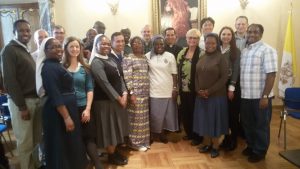When in Rome (Teach Restorative Justice)

Last spring, I again had the privilege to travel abroad to train people in Restorative Justice (“RJ”). Father Hans Zollner, S.J., director of the Pontifical Gregorian University’s Center for Child Protection in Rome, invited me to teach a segment of a diploma course addressing the Catholic sex abuse scandal. Specifically, the training involves safeguarding minors. My students included 19 religious sisters, brothers and priests representing 19 countries. It was an honor to work with such a diverse group of individuals, who are truly eager to repair the harm caused to so many innocent victims. Although I was the teacher, the students provided me with a lesson in hope and perseverance.
They had come to Gregorian University’s Center for Child Protection to learn about dealing with past sexual abuse and preventing further incidents. Originally launched in Munich in 2012, the center began educating seminarians, priests and laypeople by conducting e-learning programs and interdisciplinary research on abuse prevention. The facility moved to Rome in 2015, spotlighting and advancing the Church’s resolve to address the issue globally. This year marked the first time the center offered an in-class experience, providing participants with a certificate after four months of training.
Such was the context of my week-long experience in Rome, when I met 19 dedicated religious from Africa, India, Belgium, Mexico and South America. I essentially had a day to expose them to RJ principles. In the morning, we watched “The Healing Circle,” an RJ documentary created at Marquette’s Law School a number of years ago that depicts how healing circles involving victims, offenders and clergy have been used effectively to talk candidly about sexual abuse and its devastating impact. Hoping that the students could imagine the value of healing circles in their own communities, I immediately saw the emotional power of the presentation, which visibly hit close to home for many in the class. With the second half of the day focused on discussing other effective RJ practices in dealing with abuse, the students had many questions and stories to share.

